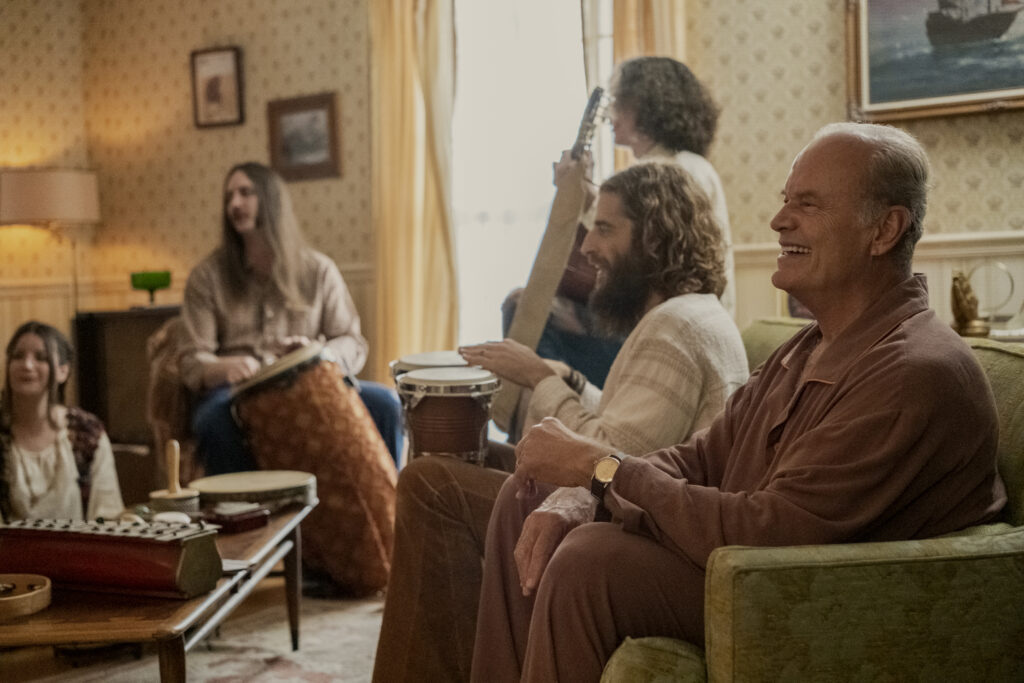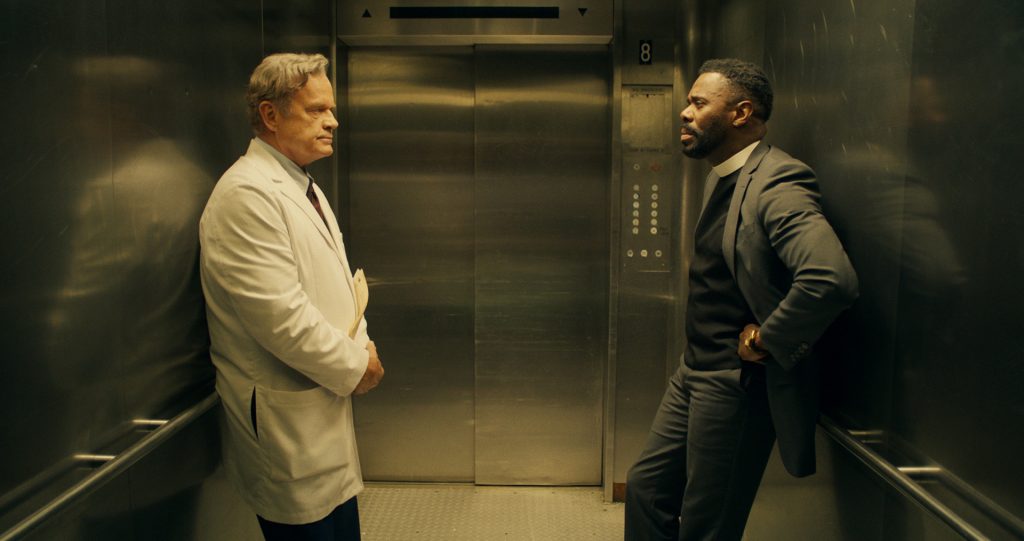March 1, 2023
by Carla Hay

Directed by Jon Erwin and Brent McCorkle
Culture Representation: Taking place primarily in California in the early 1970s (with some flashbacks to the 1960s), the faith-based dramatic film “Jesus Revolution” features a predominantly white cast of characters (with a few African Americans) representing the working-class and middle-class.
Culture Clash: A troubled and wayward teenager finds his purpose in life when he joins a group of hippies who become born-again Christians.
Culture Audience: “Jesus Revolution” will appeal primarily to people who are interested in watching faith-based biopics that make real events and real people look overly contrived for the purpose of the movie’s agenda.

The problems with “Jesus Revolution” have nothing do with religion. This 1970s-set biopic drama about Harvest Crusades founder Greg Laurie has too many bad scenes with hokey dialogue and subpar acting. Many of the cast members are not convincing as hippies. It’s an unfortunate drawback to the film, whose very foundation is about how counterculture hippies in early 1970s California became Christian fanatics who were part of the Jesus movement that spanned from the late 1960s to the early 1970s.
Directed by Jon Erwin and Brent McCorkle, “Jesus Revolution” is a disjointed and somewhat rambling movie that can’t decide how much it wants to be a biopic (which it mostly is) and how much it wants to be a historical drama about a Christian youth culture movement that peaked in 1972. Erwin and Jon Gunn co-wrote the “Jesus Revolution” screenplay, which is based on Laurie’s 2018 memoir of the same name. The movie has a lot very corny and trite scenarios that don’t look authentic at all. If this movie had not been based on a true story, then this lack of authenticity might be easier to overlook.
In its over-reaching zeal to put a glossy spin on this movement, “Jesus Revolution” never adequately addresses how hippies who wanted to drop out of society and turned to drugs could then want to become part of society and preach against their formerly “sinful” lifestyles. “Jesus Revolution” makes it look like all it would take for people to change their lifestyles so dramatically in a short period of time is to attend a few services at a church led by a sympathetic pastor. “Jesus Revolution” also looks like it deliberately omitted a lot of unflattering information about Laurie during the period of time in his life that is depicted in the movie.
Greg Laurie (played by Joel Courtney), who is the main protagonist of “Jesus Revolution,” is shown in the beginning of the movie attending a Christian group mass baptism at Pirate’s Cove in Pismo Beach, California, sometime in 1971. Most of the people getting baptisms at this event are people in their teens and 20s. Greg is about 18 years old at the time. At Pirate’s Cove, Greg is being interviewed by a reporter named Josiah (played by DeVon Franklin) from Time magazine. Josiah asks Greg, “How did you end up here?”
The movie then flashes back to a year earlier, when Greg was a student cadet at a strict military academy. At the time, he was still living with his alcoholic, divorced mother Charlene (played by Kimberly Williams-Paisley), who pressured Greg to attend this school. Greg’s father abandoned the family when Greg was a very young child and has not been in contact with Charlene or Greg ever since leaving.
It’s not clear how long Charlene has been an alcoholic, but the movie implies that she went on a downward spiral after Greg’s father left the family. Flashbacks to the 1960s show that Charlene is often a neglectful parent who gets involved in several bad relationships. (Jackson Robert Scott has the role of an adolescent Greg in these flashbacks.) In real life, Greg Laurie’s mother was married seven times. He and his mother also moved around a lot.
In the movie, Greg keeps hoping that his father will come back to the family someday, but Charlene abruptly tells him not to bother thinking that Greg’s father will ever contact them again. When Charlene decides to move to California for a fresh start, Greg is upset because he thinks that his father won’t be able to find them if they move. Charlene and Greg settle in California’s Orange County, near Long Beach. By 1970, Greg is enrolled in a military academy and not liking it very much. He is a loner who doesn’t seem to fit in anywhere.
One day, Greg (who is an aspiring illustrator) is taking photos at a park when he meets a hippie around his age named Charlie (played by Nicholas Cirillo), who is friendly and very stoned. Charlie immediately notices that Greg has been staring at Charlie’s attractive blonde friend named Cathe (played by Anna Grace Barlow), so Charlie introduces Cathe (pronounced “Cathy”) to Greg. Cathe is impressed that Greg reads the work of poet/writer Allen Ginsberg, because she does too. It’s at this point in the movie that you know Cathe and Greg will eventually fall in love with each other. Greg is instantly smitten, but he’s insecure and shy, compared to confident and outgoing Cathe.
Charlie and Cathe invite Greg to a “happening” (a gathering of young people who want to party), which is taking place in Laguna Beach. Janis Joplin (played by Erin Schaut) is doing a concert on a beach. The concert looks very fake because die-hard Joplin fans know that she never did this type of beach concert in real life.
The way Greg goes to this concert looks very phony too. Charlie and Cathe show up outside the window of a classroom where Greg is. They tell him he needs to go with them to the concert right now. When Greg gets up to leave, the classroom instructor says that if Greg leaves, he can’t come back. Greg tells the teacher that Greg is counting on not coming back.
Meanwhile, a Christian pastor named Chuck Smith (played by Kelsey Grammer) and his devoted wife Kay Smith (played by Julia Campbell) are watching the TV news in their home and expressing disgust at the hippie movement, which they think is degenerate and the cause of lot of America’s problems. “They need a bath,” Chuck sneers when he comments about hippies. (In real life, Chuck Smith founded the Calvary Chapel movement.)
Chuck leads a Costa Mesa, California-based church that is struggling with a dwindling congregation. Chuck and Kay have a slightly rebellious daughter named Janette Smith (played by Ally Ioannides), who’s about 17 years old. Janette looks bored every time she has to go to church. Unlike her parents, Janette thinks “what the hippies are doing is beautiful.” She tells her skeptical parents that hippies want the same things that conservative Christians want: “peace and love.”
One day, Janette is driving by herself on a deserted road, when she sees a hippie in his 20s who is walking by himself. Because Janette is fascinated with hippies, she stops the car and asks this stranger if he wants a ride. It’s a very unsafe thing to do, but Janette doesn’t care, because she wants to get to know a hippie instead of just hearing about hippies from the media. The hippie says yes to Janette’s offer for a ride.
His name is Lonnie Frisbee (played by Jonathan Roumie), and Janette immediately brings him home, to the horror of her parents. Lonnie admits to Chuck that he takes illegal drugs for “spiritual enlightenment,” but Lonnie insists that he is also very religious and believes in Jesus Christ. It doesn’t take long for Lonnie to invite his hippie friends to go over to the Smith house without asking permission. (How rude.)
And then the next thing you know, Lonnie and his hippie pals are going to Chuck’s church, where Lonnie gives a rambling sermon while barefoot. Some of the congregation members are repulsed and quit the church when Chuck refuses to reject and ban the hippies. Chuck sees the benefit of having young people increase his church’s attendance, so he eventually learns to accept the hippies.
Meanwhile, Greg gets involved in taking drugs and partying a lot with Charlie and Cathe. He becomes part of Lonnie’s born-again hippie Christian crowd when he meets Lonnie by chance one very rainy night. It’s another scene that looks entirely fabricated for a movie.
Greg is a passenger in a car driven by Charlie, who is intoxicated from unnamed substances. The car is swerving on a street and narrowly misses hitting another car. Greg is so freaked out, he gets out of the car and runs away. And when he runs away in the rain, he sees Lonnie walking by himself on the street, which is apparently the way that teenagers in “Jesus Revolution” meet Lonnie.
The rest of “Jesus Revolution” is a predictable slog of Greg and Cathe getting caught up in the born-again Christian movement, where they recruit other young people. Lonnie becomes an important part of Chuck’s ministry. Greg joins a Christian rock band called Love Song. Cathe’s father Dick (played by Nic Bishop) disapproves of Greg because Greg doesn’t come from a “good family.” And there’s more family drama with Greg’s mother Charlene.
Of course, “Jesus Revolution” has lots of scenes of young hippies gathered in large groups and praising the Lord in ecstasy. Although the movie makes it look like it’s all a natural high, the reality is (as Lonnie hints at in the movie), a lot it was probably done under the influence of drugs. And that’s one of many reasons why “Jesus Revolution” doesn’t look entirely honest, because in the movie, realistic drug issues are either ignored or dealt with in a preachy manner.
Although many drug-using hippies no doubt gave up having a druggie lifestyle after becoming born-again Christians, the movie doesn’t really acknowledge that a lot of the hardcore drug-using hippies who became part of the Jesus movement didn’t just wake up one day and decide to quit using drugs. “Jesus Revolution” makes it look like all these drug-using hippies suddenly became clean and sober once they became born-again Christians. In reality, people’s lives are much more complicated than that.
“Jesus Revolution” also avoids acknowledging that although the Jesus movement preached inclusivity of everyone, the young hippies (almost all are white) who get the focus in this movie came from middle-class and affluent families—in other words, people who could afford to “drop out” of society or go to college and not have the responsibilities of a steady job for a few years. At one point, Lonnie says: “We’re all orphans. We’re a movement of orphans.” Well, a lot of these “orphans” had trust funds.
Chuck’s acceptance of these hippies into his church probably wasn’t as altruistic and spiritual as the movie makes it look. There was probably a financial incentive too. More congregants can result in more donations for Chuck’s church. A lot of these hippies might have been walking around in bare feet, but they weren’t poor.
There’s a very mushy scene where Chuck responds to some churchgoers’ complaints about the hippies attending church in bare feet. In order to prove that he has the humility of Jesus Christ, Chuck washes the feet of the hippies (just like Jesus did in the Bible) when they enter his church. Chuck goes from being a hater of hippies to being one of their biggest supporters in his community.
“Jesus Revolution” has a good selection of soundtrack songs, including Rare Earth’s 1971 hit “I Just Want to Celebrate” and the Doobie Brothers’ 1972 classic “Jesus Is Just Alright.” However, the movie just looks like a bunch of cast members playing 1970s dress-up (some of them in really cheap-looking wigs) and reciting their lines of fake-sounding dialogue. And ultimately, the movie looks more like a fairy tale than an authentic depiction of real people involved in a historical movement.
Lionsgate released “Jesus Revolution” in U.S. cinemas on February 24, 2023. A special sneak-preview event of the movie was held in select U.S. cinemas on February 22, 2023.


